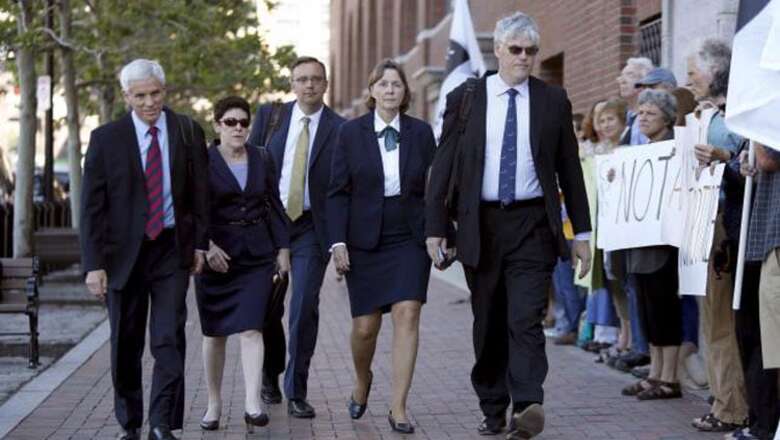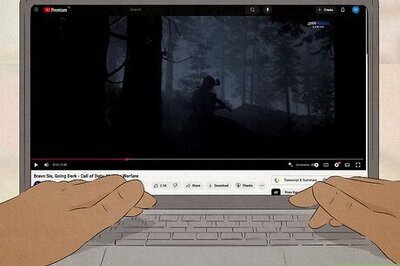
views
Boston Marathon bomber Dzhokhar Tsarnaev on Wednesday apologized for the deadly 2013 attack at a hearing, and a US judge formally sentenced him to death for killing four people and injuring 264 in the bombing and its aftermath.
"I am sorry for the lives I have taken, for the suffering that I have caused you, for the damage I have done, irreparable damage," Tsarnaev, 21, told a courtroom packed with parents of some of the dead and some of those wounded on April 15, 2013.
It was the first time that Tsarnaev, who did not speak in his own defense during his trial, had addressed the court.
"In case there is any doubt, I am guilty of this attack, along with my brother," Tsarnaev said, standing at the defense table.
Tsarnaev had been found guilty killing three people and injuring 264 in the bombing near the finish line of the world-renowned race, as well as fatally shooting a police officer three days later. The same federal jury that convicted him in April voted for the death penalty in May.
The bombing was one of the highest-profile attacks on US soil since Sept. 11, 2001.
"As long as your name is mentioned, what will be remembered is the evil you've done," US. District Judge George O'Toole told Tsarnaev before sentencing him to death by lethal injection. "What will be remembered is that you murdered and maimed innocent people and that you did it willfully and intentionally. You did it on purpose."
Tsarnaev spoke after two dozen people, including those who lost limbs and loved ones in the bombing, spoke of the attack's heavy toll on their lives.
Rebekah Gregory, who lost her left leg on that blood-soaked April day, addressed Tsarnaev directly.
"Terrorists like you do two things in this world. One, they create mass destruction, but the second is quite interesting," Gregory said. "Because do you know what mass destruction really does? It brings people together. We are Boston strong and we are America strong, and choosing to mess with us was a terrible idea.
"How's that for your victim impact statement?"
Dark memories
Tsarnaev's trial brought back some of Boston's darkest living memories. Jurors saw videos of the bombs' blinding flashes and the chaotic aftermath as emergency workers and spectators rushed to aid the wounded, many of whom lost legs.
Killed in the bombing were Martin Richard, 8, Chinese exchange student Lingzi Lu, 26, and restaurant manager Krystle Campbell, 29. Three days later, Tsarnaev and his 26-year-old brother, Tamerlan, shot dead Massachusetts Institute of Technology police officer Sean Collier, 26.
Tamerlan Tsarnaev died following a gunfight with police that ended when Dzhokhar ran him over with a car.
During the trial, federal prosecutors described the ethnic Chechen brothers as adherents of al Qaeda's militant Islamist ideology who wanted to "punish America" with the attack on the world-renowned race.
Tsarnaev's attorneys admitted their client had played a role in the attack but tried to portray him as the junior partner in a scheme hatched and driven by his older brother. The Tsarnaev family came to the United States from Russia a decade before the attack.
Even after the sentencing, the legal wrangling over Tsarnaev's fate could play out for years, if not decades. Just three of the 74 people sentenced to death in the United States for federal crimes since 1998 have been executed.
Krystle Campbell's mother, Patricia, called Tsarnaev's actions "despicable."
"You went down the wrong road," Campbell said. "I know life is hard, but the choices you made were despicable and what you did to my daughter was disgusting."
Tsarnaev asked forgiveness for himself and his dead brother.
"I ask Allah to have mercy upon me, my brother and my family," Tsarnaev said. "I ask Allah to bestow his mercy upon those who are here today."
Tsarnaev, who had been criticized by victims and Boston news media for his diffident, passive posture during his trial, said he had been moved by the months of testimony about the bombing's toll.
"You told me how horrendous this was, this burden that I put you through," Tsarnaev said. Referring to the two dozen people who spoke on Wednesday, he said, "I wish that four more people had a chance to get up there, but I took them from you."
















Comments
0 comment